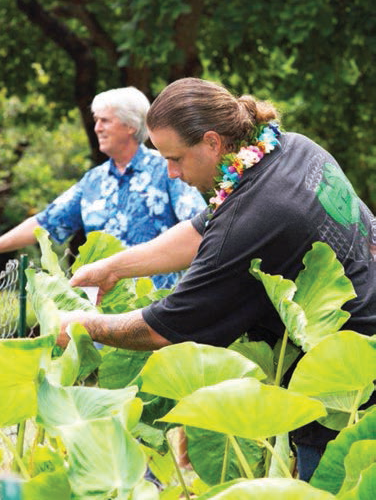Kelsey Rogers, Conservation Intern, Waimea Valley
Turning right after the first bridge of Waimea Valley will bring you to a mala of approximately 70 kalo varieties—a plant essential to the physical and spiritual wellbeing of Hawai‘i and her people. Many mo‘olelo or stories will speak to the importance of this canoe plant, and the valley supports this legacy by growing kalo, preserving varieties, and perpetuating its use through regular distribution to the community.
Kalo (Colocasia esculenta), cultivated around the world, continues to act as a connection point to Hawaii’s past, present, and future. It holds a prominent place in the mythology of Kānaka ‘Ōiwi, considered the elder brother of man and the staple food of their diet. It’s in the stories of our elders, farmers and practitioners such as the late Jerry Konanui, that Native Hawaiians can find wisdom and knowledge from those who came before us. Ma ka hana ke ‘ike, through the work we learn. What it looks like to live pono, how to be conscious and thoughtful in one’s work, and how to lead with community as the priority are all values that can be found and fostered in the practice of stewarding this sacred plant.
Thinking in present terms, kalo relies on active cultivation by people for healthy growth and development. It is in this fact that we see the importance of building pilina (relationships) and giving back to that which sustains us. This practice requires a relationship with ‘āina, knowledge of one’s surroundings, and an awareness of the impact one’s actions hold. Both an understanding of how to best serve Hawai‘i and connect to our communities can be learned through conversations held in lo’i and mala across the pae ‘āina.
As we look to the future, the need for local sustainable food sources and the overall physical health of our communities are two subjects that the growing of kalo helps to address. Studies showcasing the negative impacts of the Western diet on the health of Polynesian peoples add weight to the importance of perpetuating kalo and other traditional foods. A healthy Hawai‘i of today and tomorrow is as dependent on kalo as that of old was. Alongside culture, spirituality, and community— through kalo we pass on physical vitality and sustenance to future generations. With each hā (kalo stalk) we share, we give the gift of life.
We will continue this practice here in Waimea Valley at our upcoming Kalo and ‘Awa Day on September 10, 2022 from 8AM to 4PM. The public, local farmers, and kalo researchers will come together to give away plant material, taste the different varieties, build community, and share practices. Please join us in learning about and celebrating this agricultural giant. Learn more about Kalo and ‘Awa Day by visiting our website www.waimeavalley.net



